US Joint Chiefs Of Staff Chairman Mark Milley in an interview with NPR airing Monday morning, said that US drawdown plans are conditions-based.
“We have a plan, a series of responsible drawdown options that has been briefed to the president. I’m not going to go into specific numbers for the future,” he said.
“But we have a responsible plan to end the war with US interests clearly in mind. As you know, we the United States government signed an agreement on 28 February,” he said.
He also pointed that at that time of the deal the US had around 12,000 US troops in Afghanistan.
“That came down to, call it 8,500, 8,600 or so by mid summer, and we’re on a plan to do a responsible, deliberate drawdown to about 4,500 here very shortly. And then future drawdowns will be determined by the president. And I’m not going to disclose specific numbers and what those are. The whole agreement and all of the drawdown plans are conditions-based, and I expect that we’ll have further discussions on the conditions and ensure that they warrant,” he further said.
“The key here is that we’re trying to end a war responsibly, deliberately, and to do it on terms that guarantee the safety of the US vital national security interests that are at stake in Afghanistan,” he mentioned.
Asked if “conditions-based” meant that the drawdown timetable may always be subject to conditions on the ground, so that the mission isn’t endangered, Milley answered:
“Well, that has always been our instructions. That’s always been the agreement. That was the decision of the president on a conditions-based withdrawal. And and as you look at the agreement, the 28 February agreement, one of those conditions is: enter Afghan negotiations. Those are ongoing right now. That’s important. Another one is not attacking US forces; not conducting major attacks in the major urban areas of Afghanistan; severing ties with al-Qaida. And there’s a whole variety of other conditions. So we’re monitoring all of those conditions closely. And we’re, we the military, are giving our best military advice on those conditions so that the president can make an informed, deliberate, responsible decision,” he told NPR.
He also spoke about the peace talks and the level of violence in Afghanistan.
“They’re not finalized, so I caveat that because they are ongoing in Doha as you know. It depends. It depends on the specific condition and it depends on how you want to measure it. In terms of violence, for example, if you start measuring the violence from, call it four or five months ago, has there been a significant reduction in violence? Answer: not significant. If you measure it from two to three years ago or five years ago, there has been a significant reduction in violence.”
US President Donald Trump on Twitter on Wednesday said that “We should have the small remaining number of our BRAVE Men and Women serving in Afghanistan home by Christmas!”
Hours after Trump’s announcement, his national security adviser Robert O’Brien said Washington would reduce its forces in Afghanistan to 2,500 by early next year.
“Ultimately, the Afghans themselves are going to have to work out an accord, a peace agreement. … It’s going to be slow progress, it’s going to be hard progress, but we think it’s a necessary step – we think Americans need to come home,” O’Brien told an event at the University of Nevada, Las Vegas, Reuters quoting him as saying.
Trump and other officials have previously said the United States will go down to between 4,000 and 5,000 troops in Afghanistan around November.











